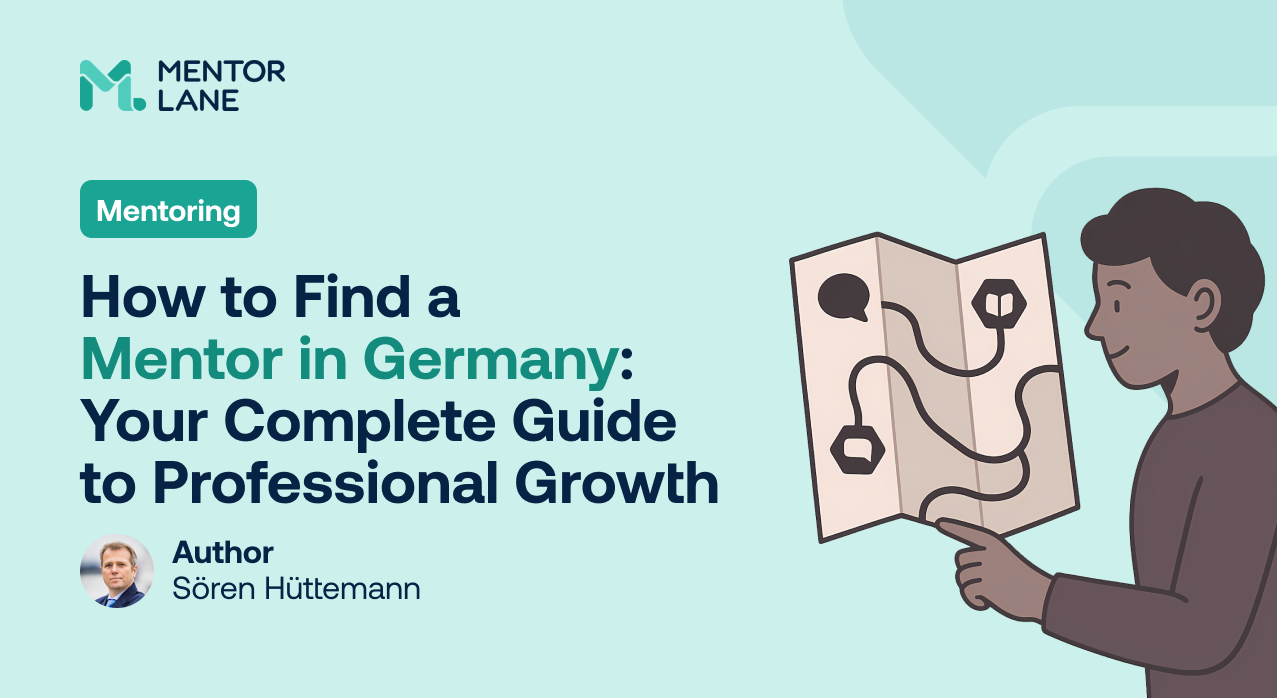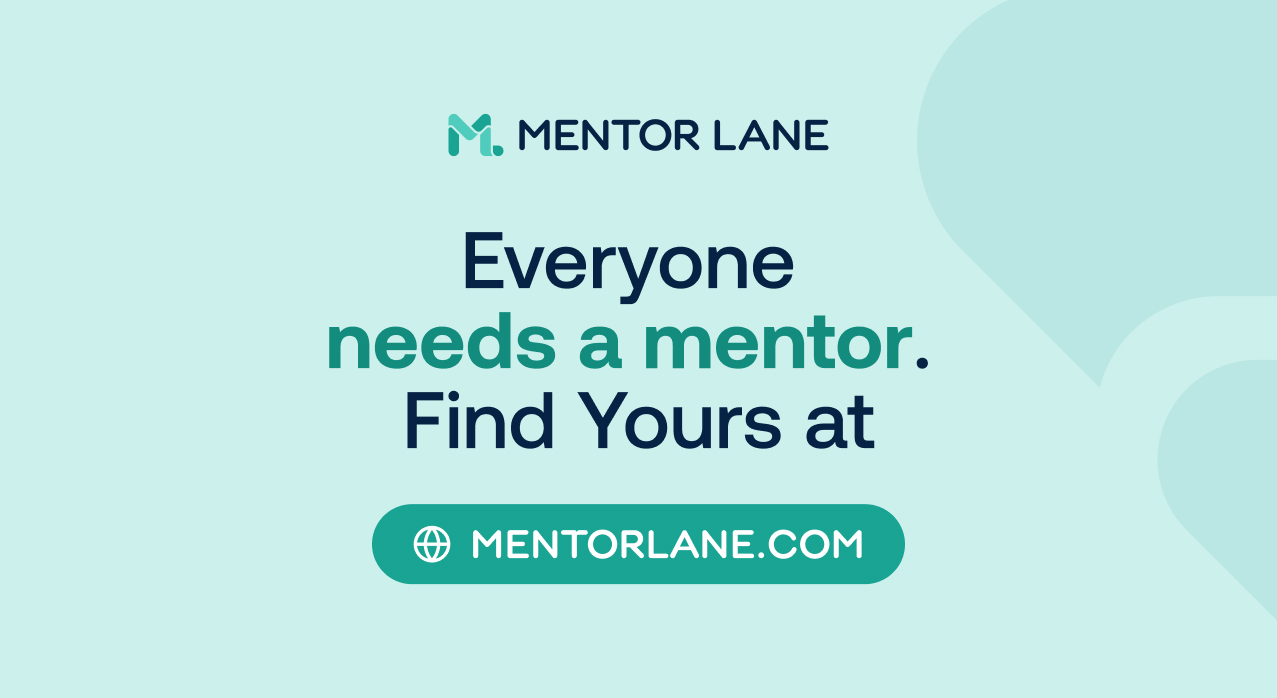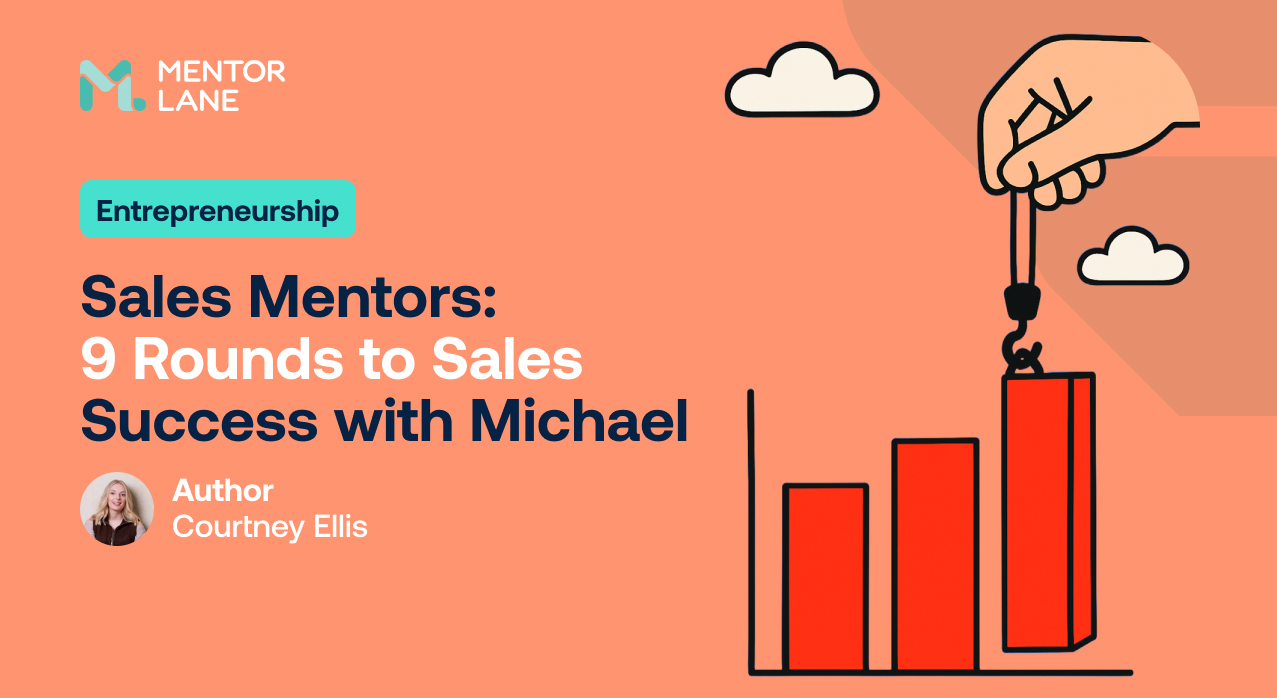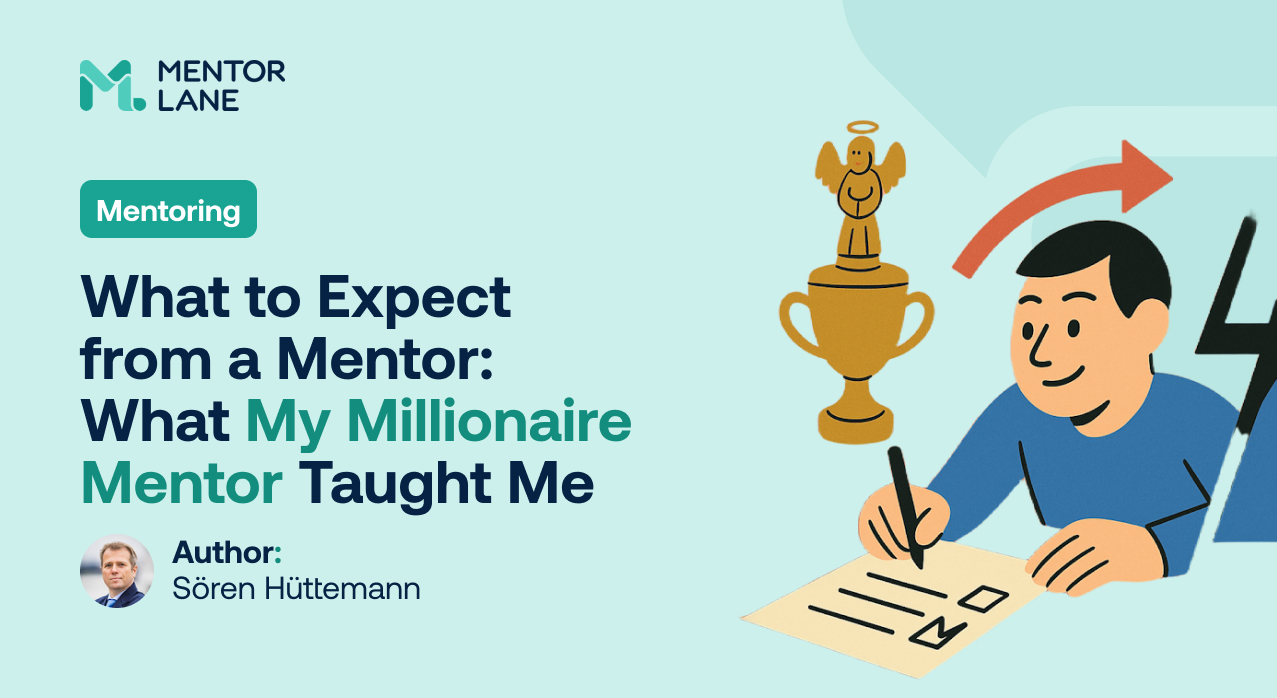News & Updates
18 Aug 23:59
15 min read
How to Find a Mentor in Germany: Your Complete Guide to Professional Growth
Find a mentor in Germany and unlock the career advice and coaching you need to excel. Discover where to find your ideal mentor today.

Sören Hüttemann
Co-Founder & CEO (Germany)

How to Find a Mentor in Germany: Your Complete Guide to Professional Growth
Finding the right mentor can transform your career trajectory in ways you never imagined.
Whether you're a recent graduate navigating your first job, an entrepreneur building your startup, or a seasoned professional seeking a career change, having someone who's already walked your path can accelerate your success exponentially.
In Germany's competitive professional landscape, mentorship isn't just a nice-to-have—it's essential.
Yet many professionals struggle with one fundamental question: How do you actually find a mentor?
This comprehensive guide will walk you through everything you need to know about finding a mentor in Germany. You'll discover where to look, how to approach potential mentors, what questions to ask, and how to build a relationship that benefits both sides.
By the end, you'll have a clear roadmap for connecting with the right mentor who can help you achieve your career goals.
Why Every Successful Professional Needs a Mentor
Before diving into the how-to, let's address the why.
Mentorship isn't about admitting weakness or lacking knowledge—it's about recognising that success rarely happens in isolation.
Consider this: 76% of professionals say mentors are important, yet only 37% currently have one.
The benefits of mentorship extend far beyond career advice:
Accelerated learning: Mentors share their wealth of experience, helping you avoid common mistakes
Network expansion: Access to your mentor's professional connections and industry contacts
Skill development: Targeted feedback on both technical expertise and soft skills
Confidence building: Support during challenging career transitions and decision-making
Industry insights: Understanding of market trends, company culture, and unwritten rules
"A mentor is someone who sees more talent and ability within you than you see in yourself, and helps bring it out of you." Bob Proctor
The mentoring relationship works both ways.
While mentees gain knowledge and guidance, mentors often find the experience personally fulfilling. They get the chance to watch someone grow, evolve and give back to their community.
Where to Find Your Ideal Mentor in Germany
Professional Matching Platforms
Social media and the ability to connect with anyone has changed how we find a mentor. Everyone is in reach and accessible. But it can be hard to find the right person amongst all the noise.
At MentorLane.com we stand out as Germany's premier mentoring platform. We use professional bespoke matching to match mentees with the perfect mentors based on career goals, industry, and personality compatibility.
Our platform includes:
Extensive network of pre-screened mentors with verified expertise across German industries
Personalised matching process tailored to your specific career needs and goals
User-friendly communication tools and integrated scheduling features
Clearly defined expectations and professional framework for successful mentoring relationships
Get started for free here:
Your Existing Professional Network
Sometimes the best mentors are hiding in plain sight. Look within your current professional circle for people whose careers you admire.
Consider these connections:
Senior colleagues in your current company
Industry speakers you caught at events and panelists
Industry contacts you've met at conferences
Alumni from your university or training programs
Professionals you follow on LinkedIn
The key is identifying someone whose career path aligns with your aspirations and who demonstrates the expertise you want to develop.
Industry Events and Networking Opportunities
Germany hosts numerous professional conferences, trade shows, and networking events throughout the year. These offer natural opportunities to find potential mentors.
Popular networking venues include:
Industry-specific conferences and symposiums
Chamber of Commerce events
Professional association meetings
Startup meetups and pitch competitions
Corporate training sessions and workshops
Co-working hubs and events
When attending these events, focus on building a connection and understanding potential mentors better. It takes time to understand someones expertise, build rapport and understand if they would make a good mentor.
LinkedIn and Professional Communities
LinkedIn remains one of the most powerful tools for professional networking in Germany. The platform allows you to research potential mentors, understand their background, and make thoughtful connection requests.
Effective LinkedIn strategies:
Join industry-specific pages and their leaders
Comment thoughtfully on posts from professionals you admire
Share your career development journey and what kind of areas you are trying to grow in. It’s surprising how often someone will jump in to share their expertise and thoughts.
Send personalised thoughtful connection requests
University and Alumni Networks
Educational institutions often maintain strong alumni networks that can be goldmines for mentorship opportunities. Many universities offer formal mentoring programs connecting recent graduates with experienced alumni.
Leverage educational connections:
Contact your university's alumni office
Attend alumni events and reunions
Join alumni associations in your city
Reach out to professors who might have industry connections
Participate in university-sponsored professional development programs
How to Approach Potential Mentors
Finding potential mentors is only half the battle. The real challenge lies in approaching them in a way that's respectful, professional, and compelling.
Do Your Homework
Before reaching out to anyone, invest time in understanding their career journey, and current focus.
Research essentials:
Career progression
Current role and responsibilities
Recent achievements or projects
Published articles or speaking engagements
Shared connections or experiences
Craft a Compelling Initial Message
Your first communication sets the tone for the entire relationship. Whether you're sending an email, LinkedIn message, or making a phone call, your approach should be professional, specific, and value-focused.
Key elements of an effective outreach message:
- Clear subject line: Make it obvious what you're requesting
- Personal connection: Reference how you found them or any shared connections
- Specific request: Be clear about what you're asking for
- Value proposition: Explain what you bring to the relationship
- Respect for their time: Acknowledge their busy schedule and suggest flexible meeting options
Start Small and Build Gradually
Don't immediately ask for a long-term mentoring commitment. Instead, request a brief coffee chat. This low-pressure approach allows you to assess compatibility before making a larger commitment.
Progressive relationship building:
- Initial conversation (20-30 minutes)
- Follow-up meeting to discuss specific challenges
- Regular check-ins if mutual interest exists
- Formal mentoring agreement if appropriate
Your First Mentoring Session
Once you've secured that initial meeting, preparation becomes crucial. A well-structured first session sets the foundation for a productive long-term guidance.
Set Clear Expectations
Begin by clarifying how you’d like the mentorship to work.
Frequency and duration of meetings:
How often will you meet?
How long will each session last?
What's the expected duration of the mentoring relationship?
Communication preferences:
In-person meetings, video calls, or phone conversations?
Email follow-ups or messaging apps?
Response time expectations
Boundaries and limitations:
What topics are appropriate to discuss?
What level of career guidance is the mentor comfortable providing?
Are there any areas where the mentor prefers not to advise?
Come Prepared with Specific Questions
Generic questions like "What advice do you have for me?" waste valuable time. Instead, prepare thoughtful, specific questions that demonstrate you've done your homework and are serious about learning.
Effective mentoring questions:
About career development:
"What skills do you think are most crucial for success in [specific field]?"
"How did you navigate the transition from [position A] to [position B]?"
"What would you do differently if you were starting your career today?"
About industry insights:
"What trends do you see shaping our industry in the next 5 years?"
"Which companies or sectors do you think offer the best growth opportunities?"
"What challenges is our industry facing that aren't widely discussed?"
About specific situations:
"I'm considering [specific opportunity/challenge]. How would you approach this?"
"What factors should I consider when evaluating [specific decision]?"
"How do you handle [specific professional challenge]?"
Document Key Insights
Take notes during your meeting, and turn on AI notetakers if your meeting on Zoom or Google meet. Make sure after each session to clarify your key next steps. Advice is wasted if you don’t put it into action.
Maximising the Value of Your Mentorship
A successful mentoring relationship requires active participation from both sides. As the mentee, it’s your responsibility for driving the relationship forward and extracting maximum value.
Define Clear Goals
Successful mentoring relationships have defined objectives. You want to see results from your mentorship. Now is the time to get crystal clear on what they should be. Make a list of your goals and dream outcome from mentoring, or choose from some of the examples below.
Career advancement goals:
Securing a promotion within a specific timeframe
Transitioning to a new role or industry
Developing leadership skills for management positions
Skill development goals:
Improving presentation and communication abilities
Enhancing technical expertise in specific areas
Building emotional intelligence and soft skills
Business development goals:
Launching a startup or new venture
Expanding an existing business
Developing strategic thinking capabilities
Network expansion goals:
Building relationships within your industry
Connecting with potential clients or partners
Establishing thought leadership in your field
How to Implement Advice and Report Back
Nothing frustrates mentors more than mentees who consistently ask for advice but never act on it. Show respect for your mentor's time by implementing their suggestions and reporting back on results.
Effective follow-through:
Try recommended strategies and report outcomes
Share both successes and challenges
Ask follow-up questions based on your experiences
Acknowledge how their advice has helped you grow
Respect Boundaries and Time Constraints
Remember that mentoring is typically a voluntary commitment. Respect your mentor's time by being punctual, prepared, and focused during meetings.
Professional courtesies:
Arrive on time for all meetings
Keep meetings within agreed timeframes
Cancel or reschedule with adequate notice
Express gratitude regularly
Offer to reciprocate value when possible
Common Mentoring Mistakes to Avoid
Everyone wants a successful mentoring experience and you deserve to get the most you can out of it.
Here’s some mistakes to avoid - they slow down your progress or make just your mentoring experience less productive.
Approaching Mentorship with the Wrong Mindset
Mistake: Treating mentors like consultants who should solve all your problems Better approach: View mentors as guides who help you develop your own problem-solving abilities
Mistake: Expecting mentors to provide job opportunities or direct career advancement Better approach: Focus on learning and skill development; opportunities often follow naturally
Poor Communication and Preparation
Mistake: Showing up to meetings without specific topics or questions Better approach: Prepare thoroughly and come with clear objectives for each session
Mistake: Dominating conversations or failing to listen actively Better approach: Ask thoughtful questions and genuinely listen to responses
Unrealistic Expectations
Mistake: Expecting immediate results or dramatic career changes Better approach: Understand that mentorship is a long-term investment in your development
Mistake: Assuming one mentor can address all your professional needs Better approach: Consider working with multiple mentors who offer different perspectives and expertise
The Mentorship Mindset
One of the biggest barriers to seeking mentorship is the misconception that asking for help indicates weakness or incompetence. This couldn't be further from the truth.
Successful professionals understand that:
Seeking guidance improves your personal wisdom and self-development
Learning from others' experiences fast-tracks your career vs making every mistake yourself.
People like being asked to help. What’s the point of having success if you can’t share it?
"If you want to go fast, go alone. If you want to go far, go together," says the African proverb.
The most successful leaders in German business—from startup founders to corporate executives—consistently state mentorship as a key factor in their success. Professional growth is accelerated through relationships, not just individual effort.
Different Types of Mentoring Relationships
Not all mentoring relationships look the same. Understanding different models can help you choose the approach that best fits your needs and circumstances.
Traditional One-on-One Mentoring
This classic model involves regular meetings between one mentor and one mentee. It offers personalised attention and deep relationship building but requires significant time commitment from both parties.
Best for:
Specific career transitions or challenges
Developing leadership skills
Industry-specific guidance
Long-term professional development
Group Mentoring
In this model, one mentor works with multiple mentees simultaneously, often in group settings. This approach allows for peer learning and diverse perspectives while requiring less individual time commitment.
Best for:
Skill development workshops
Industry overview and trends
Networking opportunities
Cost-effective mentoring programs
Reverse Mentoring
This innovative approach involves younger or less experienced professionals mentoring senior colleagues in areas like technology, social media, or emerging trends.
Best for:
Digital transformation initiatives
Understanding younger demographics
Fresh perspectives on established processes
Cross-generational knowledge transfer
Peer Mentoring
Professionals at similar career levels mentor each other, sharing experiences and supporting mutual growth.
Best for:
Career changers facing similar challenges
Entrepreneurs in similar stages
Professional development in specialised fields
Building support networks
Industry-Specific Mentoring Opportunities in Germany
Germany has an fantastic business and professional landscape that you can tap into to find your industry leaders and experts.
Technology and Startups
The German startup ecosystem, particularly in Berlin, Munich, and Hamburg, has created numerous mentoring programs and initiatives.
Key opportunities:
Rocket Internet's mentoring programs
GTEC (German Tech Entrepreneurship Center)
APX (Allianz-Plug and Play accelerator)
Manufacturing and Engineering
Germany's strength in manufacturing and engineering creates abundant mentoring opportunities in these traditional sectors.
Organisations to consider:
German Engineering Federation (VDMA)
Association of German Engineers (VDI)
Company-specific mentoring programs at major manufacturers e.g. Bosch
Finance and Banking
Frankfurt's position as a financial center provides numerous mentoring opportunities in banking, insurance, and fintech.
Potential sources:
German Banking Association’s "BankenCamp": A mentoring and networking event connecting students with senior banking professionals.
TechQuartier Fintech Mentoring (Frankfurt): Offers mentorship through accelerator programs and startup support initiatives.
Commerzbank’s Mentoring Network: Internal program matching early-career employees with senior mentors for personal and professional development.
DZ BANK Group’s Female Mentoring Program: Targeted mentoring initiative supporting women in finance and leadership.
Consulting and Professional Services
Germany's robust consulting sector offers structured mentoring programs, particularly at major firms.
Common programs:
PwC Germany’s Buddy & Career Mentoring Program: New hires are paired with peer buddies and long-term career mentors.
Roland Berger’s Mentoring Circles: Group-based mentoring for consultants at all levels, focusing on skills, leadership, and diversity.
BDU (Federal Association of German Management Consultants) Mentoring Initiative: Connects young consultants with experienced professionals across member firms.
BCG Germany’s Women\@BCG Mentorship: Focused mentoring program to support women in consulting careers and leadership development.
Duration and Evolution of Mentoring Relationships
Understanding the typical lifecycle of mentoring relationships helps set realistic expectations and plan for different phases.
Initial Phase (Months 1-3)
This phase focuses on relationship building, goal setting, and establishing communication patterns.
Key activities:
Getting to know each other personally and professionally
Defining clear objectives and expectations
Establishing meeting schedules and communication preferences
Identifying immediate challenges and opportunities
Development Phase (Months 4-12)
During this period, the relationship deepens and becomes more focused on specific development goals.
Typical focus areas:
Skill development and knowledge transfer
Career planning and strategy development
Network introductions and relationship building
Feedback on performance and progress
Maturation Phase (Year 2+)
Long-term mentoring relationships often evolve into more strategic partnerships.
Characteristics:
Less frequent but more strategic conversations
Focus on high-level career decisions
Mutual value exchange
Potential transition to peer relationship
Natural Conclusion
Healthy mentoring relationships often evolve or conclude naturally as mentees achieve their goals or circumstances change.
Signs of natural conclusion:
Mentee has achieved primary objectives
Relationship has evolved into a peer partnership
Changed circumstances for either party
Mutual agreement that formal mentoring is no longer needed
Building a Mentoring Portfolio
Rather than relying on a single mentor, consider building a diverse portfolio of mentoring relationships.
The Board of Directors Approach
Think of your mentors as a personal board of directors, each bringing different expertise and perspectives.
Potential portfolio composition:
Industry expert: Deep knowledge of your specific field
Leadership coach: Focus on management and soft skills
Network connector: Strong relationships across industries
Career strategist: Expertise in career planning and transitions
Personal development guide: Focus on work-life balance and personal growth
Measuring Mentoring Success
Don’t waste your time on something that isn’t working. Measure and monitor whether your mentor goals and objectives are being met. Here’s some KPI’s you can track to see if your mentoring scheme is paying off or if it’s time to find a new mentor.
Key Performance Indicators
Career advancement metrics:
Promotions or role changes
Salary increases
Skill certifications or training completions
Leadership opportunities
Relationship quality indicators:
Regular communication frequency
Mutual satisfaction with meetings
Referrals and introductions made
Continuation of relationship over time
Personal development markers:
Increased confidence and self-awareness
Improved decision-making abilities
Enhanced professional network
Better work-life balance
Regular Relationship Reviews
Schedule periodic reviews to assess the relationship's effectiveness.
Review questions:
Are we meeting our established goals?
What's working well in our relationship?
What could be improved?
Should we adjust our meeting frequency or format?
Are there new areas we should explore?
How MentorLane Can Accelerate Your Mentoring Journey
MentorLane.com connects you with experienced mentors in Germany who are already where you want to go.
Step 1: Create Your Mentee Profile
The foundation of successful mentor matching begins with a comprehensive profile that accurately represents your background, goals, and aspirations.
Answer multiple-choice questions about yourself and your goals The platform uses personalised matching to analyse your responses and identify mentors with complementary expertise. Your first three selected options carry more weight in the matching process, so prioritise your most important needs.
Write a personal description of yourself and your goals This is your opportunity to make a strong first impression. Share your professional background, current challenges, and specific areas where you're seeking guidance. Be authentic and specific—mentors want to work with mentees who have clear objectives and genuine commitment to growth.
Step 2: Choose Your Membership Plan
MentorLane offers flexible membership options based on your preferences: whether you want to find mentors independently on the platform, or be professionally matched to mentors.
Choose between monthly or annual subscription options. Annual plans typically offer better value and demonstrate long-term commitment to your professional development.
Step 3: Begin Your Mentorship Journey
With your profile complete and membership active, you can start sending mentorship requests to potential mentors who align with your goals.
Maximising your success:
Review mentor profiles thoroughly before sending requests
Personalise each request with specific reasons for your interest
Be clear about what you hope to gain from the relationship
Access additional resources in the mentorship guide to enhance your experience
Your Mentoring Journey Starts Now
Finding the right mentor is one of the most powerful investments you can make in your professional future. It only takes one step to completely change direction - take your first step today and find a mentor.
Visit mentorlane.com today to create your profile and begin your mentorship journey.

This post is also available in:
Related Posts
Sales Mentors: A 9-Round Guide to Sales Success with Michael Silberberger
Discover Michael’s 9-round guide to sales success. Learn how sales mentors help you build confidence, resilience, and lasting results.
What to Expect from a Mentor: What My Millionaire Mentor Taught Me
Curious what a millionaire mentor actually teaches? It's not about money tricks, it's mindset. Discover the surprising lessons that transformed Michael's approach to success and life.
How To Become a Mentor in Germany
Ever thought about becoming a mentor? Click here to work out if you're ready to become a mentor, and the steps to take to become a mentor in Germany.



-cd972d86.png)
